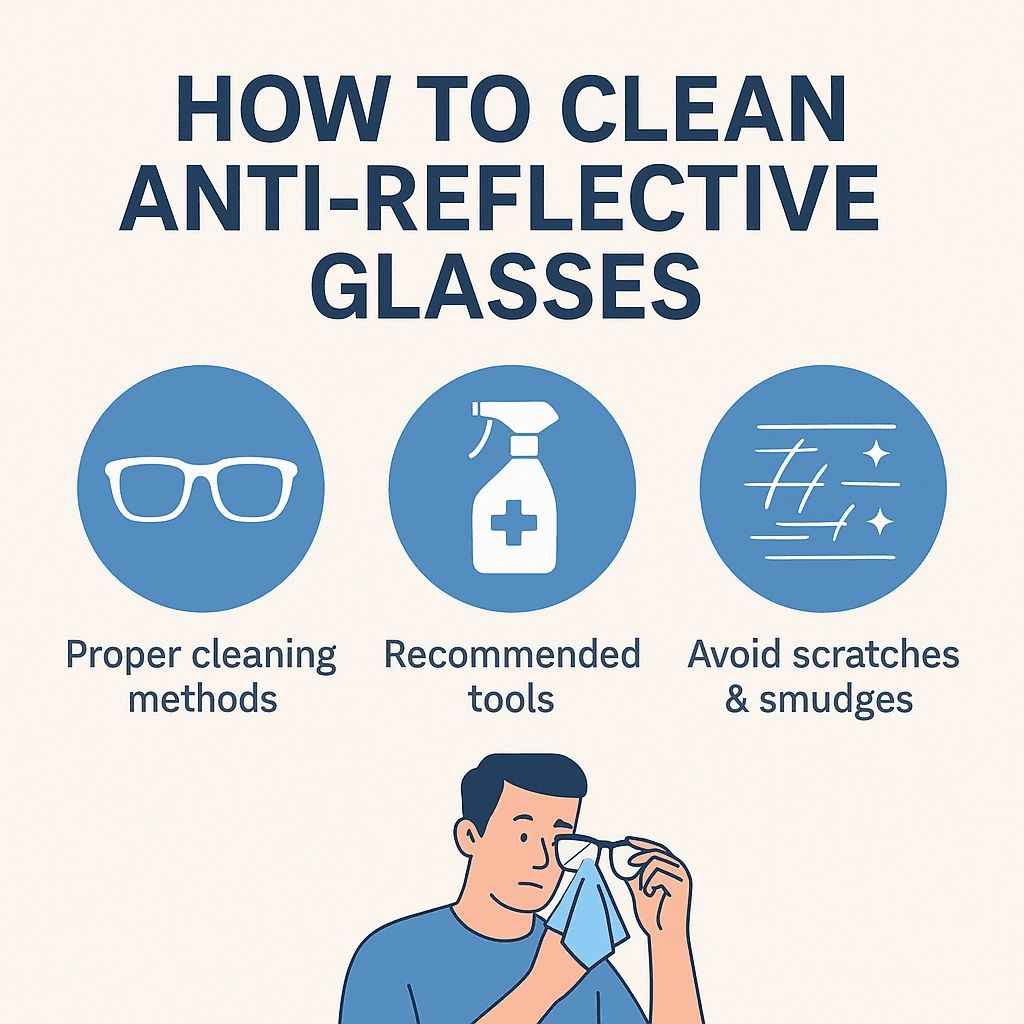Cleaning your eyeglasses with anti-reflective coating might seem like a simple task, but the process requires careful attention to avoid damaging the lenses. If you’ve ever tried cleaning your anti-reflective glasses only to end up with streaks or scratches, you’re not alone. This guide will provide you with practical tips on how to clean your glasses properly, ensuring they stay clear and in top condition. With the right materials and techniques, your anti-reflective lenses will remain spotless, enhancing your vision and prolonging their life.

1. Why is it Important to Clean Eyeglasses with an Anti-Reflective Coating?
Cleaning eyeglasses with an anti-reflective coating is essential for maintaining the quality of your lenses and enhancing your vision. Anti-reflective coating reduces glare from light sources, which improves clarity and prevents eyestrain. Over time, however, lenses accumulate dirt, smudges, and oils from your face and hands. These contaminants not only obscure your vision but can also compromise the effectiveness of the anti-reflective coating. Therefore, regular cleaning is crucial to ensure that the coating continues to perform at its best.
But here’s the kicker: If you don’t clean your glasses correctly, you may risk damaging the anti-reflective coating. Using improper materials or cleaning solutions can result in scratches or streaks that compromise the coating’s ability to reduce reflections. The good news is that cleaning your lenses the right way is easy with the right tools and techniques.
Table: Benefits of Anti-Reflective Coating
| Benefit | Description |
|---|---|
| Improved Clarity | Reduces reflections and enhances sharpness of vision. |
| Less Eye Strain | Reduces glare from digital screens and bright lights. |
| Easier Cleaning | Repels dust and fingerprints, making it easier to wipe off debris. |
| Enhanced Appearance | Lenses appear clearer and more aesthetically pleasing. |
2. What Are the Best Materials for Cleaning Anti-Reflective Glasses?
When cleaning anti-reflective glasses, it’s essential to use the right materials to avoid scratching the lenses or damaging the coating. The best material for cleaning is a microfiber cloth. These cloths are designed to trap dirt and dust particles without scratching the lens surface. Avoid using rough or abrasive materials such as paper towels, tissues, or your shirt, as they can leave fibers or scratches on the lenses.
In addition to microfiber cloths, you should use a lens cleaning solution that’s safe for anti-reflective coatings. Many store-bought cleaning solutions are formulated to clean effectively without leaving residue or damaging coatings. Avoid using household cleaning products, as they often contain chemicals that can damage or dull the coating.
What’s the real story? If you use improper materials or cleaning products, you could end up with permanent damage that diminishes the performance of your anti-reflective coating. That’s why choosing the right tools for the job is crucial.
Table: Recommended Cleaning Materials
| Material | Purpose |
|---|---|
| Microfiber Cloth | Gentle on lenses, removes dust and smudges without scratches. |
| Lens Cleaning Solution | Formulated for anti-reflective lenses, avoids streaks. |
| Lens Wipes | Convenient for quick clean-ups while on the go. |
3. How Can I Effectively Clean Eyeglasses with Anti-Reflective Coating?
Cleaning your eyeglasses with anti-reflective coating doesn’t need to be complicated. Here’s a step-by-step guide on how to clean your glasses without damaging the coating:
- Start by rinsing your glasses under lukewarm water to remove dust or debris. Never use hot water, as it can damage the lens coating.
- Apply a few drops of lens cleaning solution to the lenses.
- Use a microfiber cloth to gently wipe the lenses in a circular motion. Be sure to wipe both sides of the lenses.
- Dry your glasses with a clean microfiber cloth, using a gentle, circular motion to avoid leaving streaks.
Ready for the good part? With the right cleaning routine, your glasses will be spotless without any hassle. Regular cleaning not only keeps your lenses clear but also helps to preserve the anti-reflective coating for a longer lifespan.
Table: Step-by-Step Eyeglass Cleaning Process
| Step | Action |
|---|---|
| Step 1: Rinse | Rinse glasses with lukewarm water to remove dust and debris. |
| Step 2: Apply Solution | Add lens cleaning solution to the lenses. |
| Step 3: Wipe | Use a microfiber cloth to gently wipe both sides of the lens. |
| Step 4: Dry | Use a clean microfiber cloth to dry the lenses. |
4. What Are Common Mistakes to Avoid When Cleaning Anti-Reflective Lenses?
While cleaning anti-reflective lenses may seem simple, there are common mistakes that can cause more harm than good. One of the biggest mistakes is using harsh chemicals, such as household cleaners, which can strip away the protective coating on your lenses. Additionally, rubbing lenses too hard can lead to scratches and permanent damage.
Another common mistake is improper storage of your glasses. Leaving your glasses on a surface where dust and debris can accumulate increases the likelihood of scratches when cleaning. Always store your glasses in a case when not in use.
What’s the real story here? These small mistakes can significantly shorten the lifespan of your glasses, so it’s important to be mindful of how you clean and store them.
Table: Common Cleaning Mistakes and How to Avoid Them
| Mistake | Solution |
|---|---|
| Using harsh chemicals | Use lens-safe cleaning solutions. |
| Rubbing lenses too hard | Gently wipe lenses with light pressure. |
| Improper storage | Always store glasses in a protective case. |
5. How Do I Clean Anti-Reflective Lenses Without Leaving Streaks?
Streaks on anti-reflective lenses are one of the most frustrating issues when cleaning glasses. To prevent streaks, always ensure that the cleaning solution you use is designed for anti-reflective lenses. Avoid spraying the cleaning solution directly onto the lenses; instead, spray it onto the microfiber cloth to prevent excess moisture.
The key to streak-free glasses is drying them correctly. After wiping with the microfiber cloth, use a separate clean cloth to remove any leftover moisture. The right drying technique makes a big difference in achieving a spotless finish.
But here’s the kicker: If you don’t dry your glasses properly, the excess moisture will leave streaks behind. So, using a second cloth for drying is essential.
Table: Tips for Streak-Free Cleaning
| Tip | Action |
|---|---|
| Avoid spraying directly on lenses | Spray cleaner onto microfiber cloth, not the lenses. |
| Use a separate drying cloth | Dry lenses using a second microfiber cloth to avoid streaks. |
| Use gentle wiping motions | Always wipe gently to prevent streaks or pressure marks. |
6. Can I Clean Anti-Reflective Coated Glasses with Soap and Water?
Yes, you can clean anti-reflective coated glasses with soap and water, but it’s important to use the right kind of soap. Mild, gentle soaps, like dish soap, are ideal for removing dirt and oils without damaging the coating. Avoid using harsh soaps or cleaners, which can break down the coating and leave residues on the lenses.
What’s the real story here? It’s essential to rinse your glasses thoroughly with lukewarm water to remove all soap residue. After cleaning, dry your glasses with a microfiber cloth to avoid water spots.
Table: Soap and Water Cleaning Process
| Step | Action |
|---|---|
| Step 1: Use mild soap | Use gentle dish soap for cleaning. |
| Step 2: Rinse with lukewarm water | Rinse thoroughly to remove soap residue. |
| Step 3: Dry with microfiber cloth | Use a microfiber cloth to dry lenses. |
7. How Often Should I Clean My Anti-Reflective Glasses?
The frequency of cleaning your anti-reflective glasses depends on how often you wear them and the conditions they’re exposed to. For daily use, it’s recommended to clean your glasses at least once a day to keep them clear and free of debris. If you wear your glasses in environments where they are exposed to dirt or smoke, more frequent cleaning may be necessary.
The key to effective cleaning is addressing smudges and dirt as soon as they appear. Waiting too long to clean your glasses can cause smudges to set, making them more difficult to remove.
Table: Cleaning Frequency Recommendations
| Condition | Cleaning Frequency |
|---|---|
| Daily use | Clean once a day for optimal clarity. |
| Dusty or smoky environments | Clean more frequently to maintain clarity. |
| Occasional wear | Clean as needed, depending on exposure to dirt or debris. |
8. How Can I Protect My Anti-Reflective Lenses from Damage?
Protecting your anti-reflective lenses starts with proper storage and handling. Always store your glasses in a protective case to avoid scratches or damage from accidental drops. Avoid leaving your glasses in hot or humid environments, as this can damage the coating.
When handling your glasses, always hold them by the frames and avoid touching the lenses directly. This helps to prevent oils and dirt from transferring to the lens surface, which can affect visibility.
Table: How to Protect Your Lenses
| Tip | Action |
|---|---|
| Store glasses in a case | Always keep your glasses in a case when not in use. |
| Handle by the frames | Avoid touching the lenses directly to prevent dirt buildup. |
9. Is It Safe to Use Eyeglass Cleaning Sprays on Anti-Reflective Lenses?
It’s safe to use eyeglass cleaning sprays that are specifically formulated for anti-reflective lenses. These sprays are gentle on the coating and will not cause damage or leave streaks. However, it’s important to avoid using cleaning products that contain alcohol or ammonia, as they can strip away the anti-reflective coating over time.
Table: Safe Eyeglass Cleaning Sprays
| Brand | Features |
|---|---|
| LensCrafters Spray | Alcohol and ammonia-free, safe for anti-reflective lenses. |
| ZEISS Lens Spray | Specially formulated for coated lenses, leaves no residue. |
| Koala Eyewear Cleaner | Gentle formula, effective for daily use. |
10. Can I Use Household Items to Clean Anti-Reflective Coated Lenses?
While you can use household items for cleaning anti-reflective glasses, it’s important to choose items that won’t scratch or damage the lenses. Avoid using tissues, paper towels, or rough cloths. Instead, you can use a mixture of mild soap and water to clean your glasses, but always make sure to dry them with a microfiber cloth.
Table: Household Items You Can Use for Cleaning
| Item | Purpose |
|---|---|
| Mild soap | For cleaning, mixed with water. |
| Microfiber cloth | To wipe lenses clean without leaving scratches. |
| Soft towel | Use for drying if microfiber is unavailable. |
11. How Can I Prevent Anti-Reflective Coating from Scratching?
Scratches on anti-reflective lenses can be avoided by storing your glasses properly and using a microfiber cloth to clean them. Additionally, always clean the lenses gently, without applying excessive pressure. Regularly inspect your glasses for any signs of damage to ensure the coating is intact.
Table: How to Prevent Scratching on Lenses
| Tip | Action |
|---|---|
| Store in a protective case | Always keep your glasses safe in a case when not in use. |
| Clean gently | Use light pressure when wiping lenses with a microfiber cloth. |
12. What Are the Best Ways to Keep My Anti-Reflective Glasses Smudge-Free?
To keep your anti-reflective glasses smudge-free, always ensure they are stored in a clean, dry place. Additionally, avoid touching the lenses with your fingers, as oils from your skin can leave smudges. If smudges do appear, clean them promptly with a microfiber cloth and lens cleaner.
Table: How to Keep Lenses Smudge-Free
| Tip | Action |
|---|---|
| Store properly | Keep glasses in a clean, dry place to avoid smudges. |
| Clean as needed | Wipe lenses with a microfiber cloth as soon as smudges appear. |
13. Can Anti-Reflective Coated Lenses Get Damaged?
Yes, anti-reflective coated lenses can get damaged if not cared for properly. Scratches, discoloration, or peeling may occur if lenses are cleaned with improper materials, exposed to harsh chemicals, or left in hot environments. It’s crucial to handle and store your glasses with care to avoid this damage.
Table: Signs of Anti-Reflective Coating Damage
| Sign | Action |
|---|---|
| Scratches | Avoid using abrasive materials or harsh chemicals. |
| Discoloration | Prevent exposure to extreme temperatures or UV light. |
| Peeling | Replace lenses if the coating begins to peel or flake. |
14. Should I Take My Anti-Reflective Glasses to a Professional for Cleaning?
While regular cleaning can be done at home, it’s a good idea to take your anti-reflective glasses to a professional for a deep clean every once in a while. Professionals can use specialized tools to clean lenses more thoroughly and check for any potential issues with the coating.
Table: When to Seek Professional Cleaning
| Situation | Action |
|---|---|
| Build-up of residue | Take to a professional cleaner for thorough cleaning. |
| Annual maintenance | Have glasses checked for coating issues during yearly exams. |
15. Conclusion: How Can I Extend the Lifespan of My Anti-Reflective Coated Glasses?
To extend the lifespan of your anti-reflective coated glasses, make sure you clean them regularly using the proper techniques and materials. Avoid harsh chemicals and store your glasses in a protective case when not in use. Handling your glasses with care and performing regular maintenance will keep your lenses in top condition, ensuring they continue to provide clear, glare-free vision.
FAQ Section
Q1: What is anti-reflective coating on glasses?
Anti-reflective coating is a thin layer applied to eyeglass lenses that reduces glare, improves clarity, and enhances visual comfort. It also helps to repel smudges and makes cleaning easier.
Q2: How does anti-reflective coating work?
The coating works by reducing reflections and glare on the lenses. This allows more light to pass through, improving vision clarity, especially in low-light conditions.
Q3: Can I use regular soap to clean my anti-reflective glasses?
Yes, mild soap and lukewarm water can be used to clean your glasses. However, avoid harsh soaps or hot water, as they may damage the anti-reflective coating.
Q4: How often should I clean my anti-reflective glasses?
You should clean your glasses whenever they become dirty or smudged. For regular maintenance, cleaning once a day is ideal, but frequency may vary depending on use.
Q5: Are there any special tools needed to clean anti-reflective glasses?
The best tool for cleaning anti-reflective glasses is a microfiber cloth. You can also use specialized lens cleaning solutions that are safe for coated lenses. Avoid using tissues or paper towels that may scratch the lenses.

